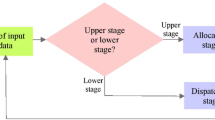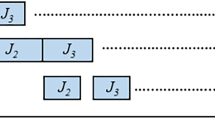Abstract
We investigate the flexible flow shop scheduling problem with limited or unlimited intermediate buffers. A common objective of the problem is to find a production schedule that minimizes the completion time of jobs. Other objectives that we also consider are minimizing the total weighted flow time of jobs and minimizing the total weighted tardiness time of jobs. We propose a water-flow algorithm to solve this scheduling problem. The algorithm is inspired by the hydrological cycle in meteorology and the erosion phenomenon in nature. In the algorithm, we combine the amount of precipitation and its falling force to form a flexible erosion capability. This helps the erosion process of the algorithm to focus on exploiting promising regions strongly. To initiate the algorithm, we use a constructive procedure to obtain a seed permutation. We also use an improvement procedure for constructing a complete schedule from a permutation that represents the sequence of jobs in the first stage of the scheduling problem. To evaluate the proposed algorithm, we use benchmark instances taken from the literature and randomly generated instances of the scheduling problem. The computational results demonstrate the efficacy of the algorithm. We have also obtained several improved solutions for the benchmark instances using the proposed algorithm. We further illustrate the algorithm’s capability for solving problems in practical applications by applying it to a maltose syrup production problem.
Similar content being viewed by others
References
Akturk, M. S., & Yildirim, M. B. (1998). A new lower bounding scheme for the total weighted tardiness problem. Computers and Operations Research, 25(4), 265–278.
Azizoglu, M., Cakmak, E., & Kondakci, S. (2001). A flexible flow shop problem with total flow time minimization. European Journal of Operational Research, 132(3), 528–538.
Goudie, A. (1993). The nature of the environment. Oxford: Blackwell Sci.
Grabowski, J., & Pempera, J. (2000). Sequencing of jobs in some production system. European Journal of Operational Research, 125(3), 535–550.
Holy, M. (1982). Erosion and environment. Elmsford: Pergamon.
Hull, P. (2010). Glucose syrups: Technology and applications. New York: Wiley–Blackwell.
Kim, I. K., Jung, D. W., & Park, R. H. (2002). Document image binarization based on topographic analysis using a water flow model. Pattern Recognition, 35(1), 265–277.
McCormick, S. T., Pinedo, M. L., Shenker, S., & Wolf, B. (1989). Sequencing in an assembly line with blocking to minimize cycle time. Operations Research, 37(6), 925–936.
Oh, H. H., Lim, K. T., & Chien, S. I. (2005). An improved binarization algorithm based on a water flow model for document image with inhomogeneous backgrounds. Pattern Recognition, 38(12), 2612–2625.
Pedersen, S., & Vang-Hendriksen, H. (2001). Method for production of maltose and/or enzymatically modified starch. World Intellectual Property Organization, International Publication Number: WO 01/16349 A1.
Pinedo, M. (2005). Planning and scheduling in manufacturing and services. New York: Springer.
Quadt, D., & Kuhn, H. (2007). A taxonomy of flexible flow line scheduling procedures. European Journal of Operational Research, 178(3), 686–698.
Ribas, I., Leisten, R., & Framinan, J. M. (2010). Review and classification of hybrid flow shop scheduling problems from a production system and a solutions procedure perspective. Computers and Operations Research, 37(8), 1439–1454.
Ruiz, R., & Vazquez-Rodriguez, J. A. (2010). The hybrid flow shop scheduling problem. European Journal of Operational Research, 205(1), 1–18.
Sawik, T. (2000). Mixed integer programming for scheduling flexible flow lines with limited intermediate buffers. Mathematical and Computer Modeling, 31(13), 39–52.
Sawik, T. (2001). Mixed integer programming for scheduling surface mount technology lines. International Journal of Production Research, 39(14), 3219–3235.
Shah-Hosseini, H. (2007). Problem solving by intelligent water drops. Proceedings IEEE Congress on Evolutionary Computation CEC, 2007, 3226–3231.
Shah-Hosseini, H. (2008). Intelligent water drops algorithm: A new optimization method for solving the multiple knapsack problem. International Journal of Intelligent Computing and Cybernetics, 1(2), 193–212.
Shah-Hosseini, H. (2009). The intelligent water drops algorithm: a nature-inspired swarm-based optimization algorithm. International Journal of Bio-Inspired Computation, 1(1–2), 71–79.
Sherali, H. D., Sarin, S. C., & Kodialam, M. S. (1990). Models and algorithms for a two-stage production process. Production Planning and Control, 1(1), 27–39.
Tang, L. X., & Xuan, H. (2006). Lagrangian relaxation algorithms for real-time hybrid flowshop scheduling with finite intermediate buffers. Journal of the Operational Research Society, 57(3), 316–324.
Tavakkoli-Moghaddam, R., Safaei, N., & Sassani, F. (2009). A memetic algorithm for the flexible flow line scheduling problem with processor blocking. Computers and Operations Research, 36(2), 402–414.
Wardono, B. (2001). Algorithms for the multi-stage parallel machine problem with buffer constraints. Ph.D. dissertation, North Carolina State University.
Wardono, B., & Fathi, Y. (2004). A tabu search algorithm for the multi-stage parallel machine problem with limited buffer capacities. European Journal of Operational Research, 155(2), 380–401.
Wittrock, R. J. (1988). An adaptable scheduling algorithm for flexible flow lines. Operations Research, 36(3), 445–453.
Author information
Authors and Affiliations
Corresponding author
Rights and permissions
About this article
Cite this article
Tran, T.H., Ng, K.M. A water-flow algorithm for flexible flow shop scheduling with intermediate buffers. J Sched 14, 483–500 (2011). https://doi.org/10.1007/s10951-010-0205-x
Published:
Issue Date:
DOI: https://doi.org/10.1007/s10951-010-0205-x




